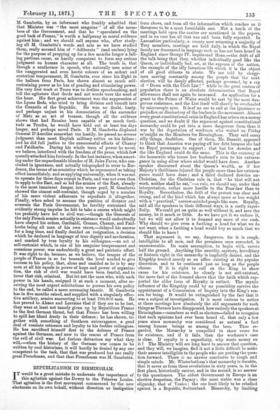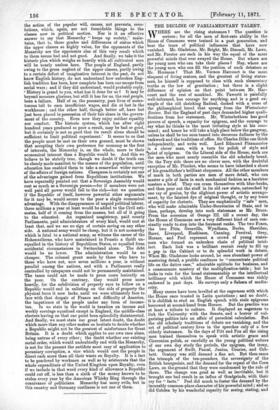REPUBLICANISM IN BIRMINGHAM.
IT would be a great mistake to underrate the importance of this agitation against the Dowry to the Princess Louise. That agitation is the first movement commenced by the new electorate on its own behalf, without direction or instigation from above, and from all the information which reaches us it threatens to be a most formidable one. Not a tenth of the meetings held upon the matter are mentioned in the papers, and in no case has all that was said been fully reported. In Lancashire particularly, a county now returning a majority of Tory members, meetings are held daily, in which the Royal family are denounced in language such as has not been heard in England since George IV. imprisoned Hone, the drift of all the talk being that they, whether individually good him the Queen, or individually bad, set, at the expense of the nation, the example of the idly luxurious life which it is the object of all good citizens to abate. We are told by clergy- men moving constantly among the people that the next election will be deeply affected, perhaps governed, by a cry of " Down with the Civil List ! " while in the great centres of population there is an absolute determination that Royal allowances shall not again be increased. An application for a grant to the Prince of. Wales would be met by the most dan- gerous resistance, and the List itself will shortly be overhauled by microscopic eyes. It is of no use to rail at the ignorance or prejudice, or discourtesy of the leaders in the movement. Almost every great constitutional crisis inEngland has arisen on a money question, and we doubt if the argument against constitutional monarchy could be put into a more dangerous form than it was by the deputation of workmen who waited on Friday se nnight on the Members for Birmingham. They said many silly things, doubtless. One of them, Mr. Basnett, appeared to think that America was paying off her debt because she had no Royal personages to support ; that but for dowries and the like England could do the same. This is the economy of the housewife who traces her husband's ruin to his extrava- gance in using silver where nickel would have done; Another speaker discoursed about the Queen's wealth, as if her Majesty's thriftiness injured the people more than her extrava- gance would have done ; and a third declared dowries un- Christian, for the Christian rule is, that " he that will not work, neither shall he eat,"—a rule, we should say, under that interpretation, rather more hostile to the Poor-law than to Royalty. Nevertheless, the drift of the protest was clear and strong, and of the kind which has always more or less weight with a " practical," narrow-minded people like ours. Royalty, said all the speakers in their different ways, is a costly super- fluity. We could get on quite as well without it, and save the money, be it much or little. As we have got it we endure it, but we will not allow it to demand any more of our cash. Why should we give even a farthing a head for what we do not want, when a farthing a head would buy so much that we should like to have ?
That argument is, we say, dangerous, for it is rough, intelligible to all men, and the premisses once conceded, is unanswerable. Its main assumption, to begin with, covers half the ground. Anything like sanctity, mystery, hereditary or historic right in the monarchy is implicitly denied, and the Kingship treated merely as an office existing at the popular discretion, and to be continued just so long as the people choose. If it is right to call on the King to show cause for his existence, he clearly is not self-existent, the mere fact of the demand shows that the faith which sup- ported the older form of Royalty is extinct. The mystic influence of the Kingship could by no possibility survive the appointment of a Commission of Inquiry into the King's rea- son for being. It would be extinguished by the fact that it was a subject of investigation. It is most curious to notice at these meetings how absolutely the old arguments for such things as Thrones have disappeared, how entirely the speakers at Birmingham—members as well as electors—failed to recognize that such opinions had ever been heard of, that only a few years since monarchy was considered as natural a fact among human beings as among the bees. Thus re- garded, the Monarchy is compelled to show cause for its existence, and if it fails, then the workmen's case is clear. If royalty is a superfluity, why waste money on it V The Ministry will ere long have to answer that question, and they will, we imagine, find it not a little difficult to make their answer intelligible to the people who are putting the ques- tion forward. There is no answer conclusive to rough and simple minds. Mr. Winterbotham's that monarchy is durable, that it saves us from three revolutions in sixty years, is, in the first place, historically untrue, and in the second, is no answer to the questioners. The oldest Government in Europe is an elective despotism, the Papacy ; the most stable was a close oligarchy, that of Venice ; the one least likely to be rebelled against is a Republic, Switzerland. Monarchy, by limiting
the action of the popular will, causes, not prevents, revo- lutions, which, again, are not formidable things to the classes now in political motion. Nor is it an effective answer to say that Monarchy " keeps up society," main- tains, that is, those grades and differences of status which the upper classes so highly value, for the opponents of the Monarchy are the opponents also of this very result which to them seems bad and not good. And finally, we take it the historic plea which weighs so heavily with all cultivated men will be nearly useless here. The people of England, partly owing to the gross neglect of the upper classes, partly owing to a certain defect of imaginative interest in the past, do not know English history, do not understand how unbroken Eng- lish tradition has been, how complete has been our escape from social wars ; and if they did understand, would probably reply, ' History is grand to you, what has it done for us ? It may be beyond measure glorious, but still it has for us, the real people, been a failure. Half of us, the peasantry, pass lives of mono- tonous toil to earn insufficient wages, and die at last in the workhouse ; and the other half, though better off, have but just been placed in possession of their fair share in the govern- ment of the country. Even now they enjoy neither equality nor comfort. The historic system, which has after eight hundred years produced so poor a result, may be bad or good, but it certainly is not so good that its result alone should be sufficient to limit political experiment.' It seems to us that the people must be met on their own ground, must be shown that accepting their own preference for economy as the first of interests, the Monarchy is, on the whole, more to their economical interest than a Republic would be. And this we believe to be strictly true, though we doubt if the truth can be clearly made manifest to the masses of the population, until education has enabled them to take a somewhat wider survey of the affairs of foreign nations. Cheapness is certainly not one of the advantages gained from Republican institutions. We have repeatedly pointed out that a Sovereign Assembly would cost as much as a Sovereign person—for if members were not well paid all power would fall to the rich—but we question if the Republic of itself, however powerful other arguments for it may be, would secure to the poor a single economical advantage. With the disappearance of unpaid political labour, three millions a year at least would be added to the Civil esti- mates, half of it coming from the masses, but all of it going to the educated. An organized magistracy, paid county Parliaments, paid administrators of every kind, would cost at least that, and we see no sign of certain saving on any other side. A national army would be cheap, but it is not monarchy which is fatal to a national army, as witness the career of the Hohenzollerns, who have maintained in Prussia a thrift un- equalled in the history of Republican States, or equalled from accidental circumstances in Switzerland alone. The debt would be no lower. The administration would be no cheaper. The colossal grant made by those who have to those who have not, now seven millions a year, is without parallel among the nations, and with a Parliament really controlled by ratepayers could not be permanently maintained. The taxes could not be made to press more leniently on the poor. On the contrary, they would press more heavily, for the subdivision of property sure to follow on a Republic would end in enlisting on the side of property the physical force it now lacks, until we were ultimately face to face with that despair of France and difficulty of America, the impatience of the people under any form of income- tax. In no state in the world is taxation on income and weekly earnings equalized except in England, the middle-class electors having on that one point been splendidly disinterested. And finally, we must state our great latent doubt, the doubt which more than any other makes us hesitate to decide whether a Republic might not be the greatest of misfortunes for Great Britain. It is a doubt which applies to our own race alone, being untrue of every other ; the doubt whether our existing social order, which would undoubtedly end with the Monarchy, is not for the present the antidote most easy of application to pecuniary corruption, a vice which would cost the people in direct cash more than all their waste on Royalty. It is a fact to be pondered by workmen as well as by aristocrats that the whole expenditure of the United Kingdom upon Royalty, even if we include in that word every kind of allowance a Republic could cut off, is less than a sixth of the money known to be stolen every year by the American Whisky Ring through the connivance of politicians. Monarchy has many evils, but in thia country and Germany costliness is not one of them.































 Previous page
Previous page